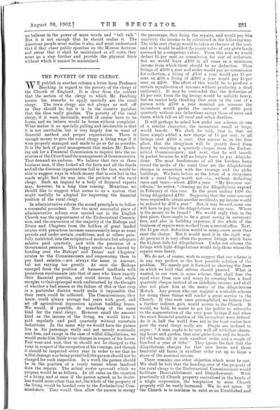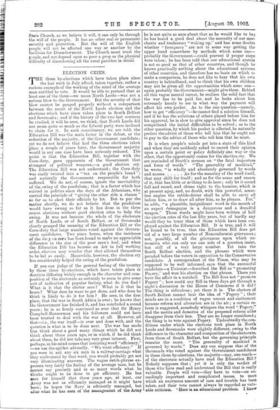THE POVERTY OF THE CLERGY.
WE publish in another column a letter from Professor Beeching in regard to the poverty of the clergy of the Church of England. It is clear from the context that the section of the clergy to which Mr. Beeching means his remarks to apply specially are the rural clergy. The town clergy are not always so well off as they should be, but it is in the country parishes that the shoe really pinches. The poverty of the rural clergy, if it were inevitable, would of course have to be borne, and we believe would be borne without complaint. What makes it so specially galling and intolerable is that it is not inevitable, but is very largely due to want of financial method and proper organisation. There is enough money to give the rural clergy a living wage if it were properly managed and made to go as far as possible. It is the lack of good management that makes Mr. Beech- ing ask for a Financial Commission to inquire into the re- sources of the Church and the management of those resources. That demand we endorse. We believe that two or three business men, if they looked all the facts and all the funds and all the diocesan organisations full in the face, would be able to suggest ways in which money that is now lost in the sands might find its way into the pockets of the rural clergy. Such an inquiry by a body of financial experts may, however, be a long time coming. Meantime, we should like to suggest what seems to us a system that might usefully be adopted for improving the financial position of the rural clergy. In administrative reform the sound principle is to follow a successful precedent. Now the most successful piece of administrative reform ever carried out in the English Church was the appointment of the Ecclesiastical Commis- sion, and the conversion of the majority of the Bishops and Deans and Chapters from the holders of great landed estates with precarious incomes unnecessarily large at some periods and under certain conditions, and at others pain- fully restricted, into the recipients of moderate but adequate salaries paid quarterly, and with the precision of a Government pension. This happy result was aphieved by handing over the Bishops' and Deans' and Chapters' estates to the Commissioners and empowering them to pay fixed salaries,—not always the same in amount, but not varying too greatly. At once the Bishops emerged from the position of harassed landlords with precarious emoluments into that of men who knew exactly their financial position, and could devote their whole energies to their episcopal work undisturbed by the thought of whether a bad season or the failure of this or that crop in a particular district would make it impossible that their rents could be collected. The Commissioners, they knew, could always average bad years with good, and set off agricultural depression against building leases. We would, if possible, do something of the same kind for the rural clergy. However small the amount fixed as the income of the living, we would have it paid regularly and paid quarterly without uncertain deductions. In the same way we would have the parson live in his parsonage really and not merely nominally rent free, and except in the case of wilful dilapidations, we would make him liable to no charges in respect of his house. Fair wear and tear, that is, should not be charged to the vicar in respect of the occupation of his vicarage, and though it should be inspected every year in order to see that no wilful damage was being permitted, the parson should not be charged for such inspection. In a word, the parson should be in the position of a yearly tenant whose landlord does the repairs. The actual modus opera ndi which we propose would be as follows. In all cases on the vacation of a living, and at once if the parson agreed, as he doubt- less would more often than not, the whole of the property of the living would be handed over to the Ecclesiastical Com- missioners. They would then allow the parson to occupy the parsonage, they doing the repairs, and would pay him quarterly the income to be calculated in the following way. The tithe rent charge would be taken at the rate of the year, and to it would be added the yearly value of any glebe lands assessed by a competent valuer. From this sum we would deduct 15 per cent. as commission for cost of collection. but we would leave £100 in all cases as a minimum income from which there should be no deduction. Thus livings of £100 a year and under would pay no commission for collection, a living of £150 a year would pay 15 per cent. on £50, a living of £300 a year would pay 15 per cent. on £200. The effect of this would be to produce a certain equalisation of incomes without producing a dead uniformity. It may be contended that the deduction of 15 per cent. from the big livings would be unfairly heavy, but we cannot help thinking that even in the case of a parson with £700 a year nominal net revenue the incumbent would prefer the certainty of £610 paid quarterly without any deductions except those of rates and taxes, which fall on all rural and urban dwellers.
It will perhaps be asked how under our scheme, or one of a similar character, the incumbent, small or large, would benefit. We shall be told, that is, that we have simply added a new charge of 15 per cent, to all livings over £100 a year. Our answer is, in the first place, that the clergyman will be greatly freed from worry by receiving a quarterly cheque from the Ecclesi- astical Commissioners ; and next, that he will benefit in pocket because he will no longer have to pay dilapida- tions. The most burdensome of all the burdens hung round the necks of the rural vicar are the dilapidations charges in connection with the vicarage and the glebe buildings. We have before us the letter of a clergyman with a rural living worth net—i.e., without deducting rates and taxes—about £250 a year. " My five-year cer- tificate," he writes, " clearing me for dilapidations expired in February of this year. In the years ending 1896 the living dilapidated £180. Supposing that the same amount were required to obtain another certificate, myincome would be reduced by £36 a year." But, it may be said, some one will have to pay for the dilapidations in any case. Where is the money to be found ? We would reply that, in the first place, there ought to be a great saving in surveyors' fees, and also in building expenses, if the whole of the business of repairs were worked from a central office. Next, the 15 per cent. deduction would in many cases more than meet the charge. But it would meet it in the right way. At present it is very often the poorest livings which have the highest bills for dilapidations. Under our scheme the livings with light dilapidations would help those where the repairs-were heavy.
We do not, of course, wish to suggest that our scheme is in any way perfect or the best possible solution of the problem. We merely put it forward as showing the lines on which we hold that reform should proceed. What is wanted, in our view, is some scheme that shall free the rural vicar from care and worry by securing him a fixed quarterly cheque instead of an indefinite income, and shall also not place him at the mercy of the dilapidations Moloch. Any person who can suggest a workable scheme for doing these things will render a great service to the Church. If this were once accomplished, we believe that a further indirect gain would accrue to the Church. It would, we hold, be easier to get the public to subscribe to the augmentation of the very poor livings if and when the exact financial position of the incumbent were defined. As it is, half the world does not in the least realise how poor the rural clergy really are. People are inclined to argue : " A man ought to be very well off with that charm- ing house and garden, that nice glebe farm and its beauti- ful old barns, all in such excellent order, and a couple of hundred a year of tithe." They ignore the fact that the dilapidations charges for that nice house and those beautiful old barns in excellent order eat up so large a share of the nominal income.
There remains one other objection which must be met. We shall be told that the handing over of the property of the rural clergy to the Ecclesiastical Commissioners would facilitate Disestablishment and Disendowment. With practically all Church property centralised in the hands of a single corporation, the temptation to seize Church property will be vastly increased. We do not agree. If the Church is to continue to exist as an Established and State Church, as we believe it will, it can only be through the will of the people. It has no other real or permanent security and protection. But the will of the English people will not be affected one way or another by the facilities for Disendowment. The Church must trust the people, and not depend upon so poor a prop as the physical difficulty of disendowing all the rural parishes in detail.







































 Previous page
Previous page